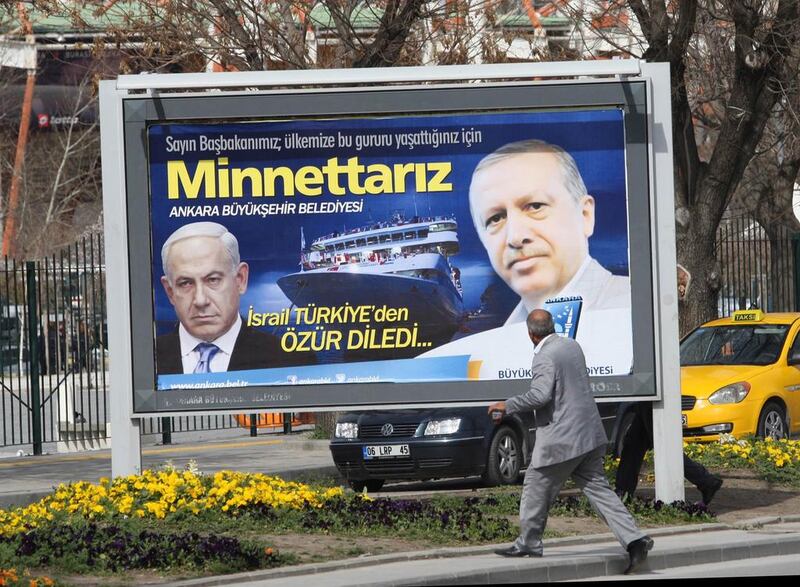Turkey and Israel are close to agreeing on a full restoration of diplomatic ties after five years of hostility. The dispute began when Israeli commandos stormed the Mavi Marmara, a ship carrying Turkish activists attempting to break Israel’s blockade of the Gaza Strip, killing 10. The heavy-handed Israeli response had a dramatic effect on the Turkish public and provided Recep Tayyip Erdogan with an ideal scapegoat to advance his own regional policy. Now, the countries are close to becoming friends again, with economics, not ideology, driving the reconciliation.
In the years that followed the Mavi Marmara attack, Mr Erdogan fashioned himself as a regional champion of Palestinian rights. After the Arab Spring, Turkish leaders sensed a new regional order on the horizon and tried to capitalise on it. Mr Erdogan’s support for Hamas in Gaza, along with Turkey’s close cooperation with the Muslim Brotherhood in Egypt, positioned Ankara as part of a new axis of power in the region.
The Turkish economy was strong and Istanbul was re-emerging as a global city. The national airline was opening new routes at a frenzied speed, bringing the world to Istanbul. Ankara aligned itself with the new regimes in the region and forcefully adopted an anti-Assad stance in Syria.
Mr Erdogan’s pro-Palestinian stance was a critical aspect of his new regional appeal. But attacking Israelis with rhetoric belied the deep economic relationship between the two countries. At the height of the standoff between Tel Aviv and Ankara, Turkish Airlines was the second-largest operator of flights out of Tel Aviv’s international airport.
Mr Erdogan’s shrill Palestinian support and condemnation of the Israeli occupation seems out of place when his national airline was happily carrying Israelis around the world. And Israelis had no problem using Istanbul as their gateway to the world, despite the dire state of diplomatic relations.
According to former Turkish diplomats a framework to restore full relations was finalised long ago. Turkish demands included a compensation fund for the families of the victims that Israel killed, an admission of wrongdoing, and an end to the Israeli blockade of the Gaza Strip. While Israeli media have reported that a fund totalling $20 million has been set up, there has been no confirmation that Israel will budge on the issue of Gaza.
By the looks of it, Turkey’s demand was made more as a symbolic device and there will be little change to Israel’s near total control over Gaza. On his last visit to Israel, Barack Obama managed to secure a phone call from Benjamin Netanyahu to Mr Erdogan, in which the Israeli prime minister apologised for the killing of the activists. In turn, Turkey has reportedly agreed to drop criminal charges against a handful of Israeli military commanders. Ankara has also reportedly agreed to prevent a handful of senior members of Hamas from entering Turkey and establishing an operations base. None of these conditions has changed much in the past four years, so the question remains: why are the countries so close to restoring full diplomatic ties? The answer lies under the azure waters of the Mediterranean.
Since Israel’s discovery of massive natural gas deposits off the coast of Haifa, the Eastern Mediterranean basin has proven to hold one of the largest deposits of natural gas in the world.
Israelis joke that they have the only slice of land in the Middle East without hydrocarbons. As such, the country gave exploration companies favourable deals to explore for oil and gas. After years of debate over how to manage the gas discoveries, Israel’s parliament passed a controversial deal in early September that is widely seen to give drilling companies a monopoly. Regardless, Israel is ready to drill and now needs a partner to transport the gas to Europe.
During the freeze in relations with Turkey, Israel has been flirting with Greece as a possible suitor for its natural gas. Given the state of the Greek economy, Athens has obviously been keen to work with Israel, even offering to forcibly reject European Union directives to label Israeli settlement goods. It seems as though Tel Aviv was leading on the Greeks only to get Turkey’s attention.
Israeli officials have hinted that the reconciliation deal now hinges on the creation of a pipeline between Israeli offshore gasfields and Turkey’s transport infrastructure.
As part of Mr Erdogan’s regional ambitions, Turkey has built an impressive network of oil and gas pipelines. Without hydrocarbon resources of its own, Turkey is highly dependent on other countries to keep the lights on.
One such country is Russia. Given the continued fallout with Moscow over Turkey’s downing of a Russian jet that briefly entered its airspace during a recent mission in Syria, Ankara is facing a natural gas shortage in the middle of winter. Mr Erdogan’s previously strong bargaining position has thus been greatly diminished. Between the natural gas issue and Turkey’s need for strong allies, Ankara has no choice but to make nice with Tel Aviv. The United States has long made clear its intention to resolve the dispute between Israel and Turkey.
When the deal is done and diplomatic relations are fully restored, the biggest losers will be the Palestinians. They have been used as a rhetorical pawn. With natural gas forming a bond between Turkey and Israel in the coming decades, the Palestinians can expect little more than rhetoric from their friends in Ankara.
jdana@thenational.ae
On Twitter: @ibnezra





